Linbeymusol
Wonderful character development!
InformationRap
This is one of the few movies I've ever seen where the whole audience broke into spontaneous, loud applause a third of the way in.
Stephan Hammond
It is an exhilarating, distressing, funny and profound film, with one of the more memorable film scores in years,
Myron Clemons
A film of deceptively outspoken contemporary relevance, this is cinema at its most alert, alarming and alive.
Helio
For a 75 minute timeframe this documentary covers a lot of complex ground and background during the deKlerk to Mandela transition of power from white to black South Africa. There is an appreciation and understanding of some of the things that happened. The Afrikaaner regime was in response to the English treament of the boers - particularly the tens of thousands that died in the English run concentration camps. DeKlerk says they did not set out to rule blacks. Yet there were policies to encourage !Xhosa opposing Zulu.Although the international sanctions did not seem to have much effect the film suggests it did. Moreover it was the decline of the influence Communism (the fall of the Berlin Wall) that set the stage for transition. The threat of Communism was not as great, which is what the Afrikaaners claimed to be fighting.Yet it still took a certain individual, deKlerk, to dismantle Apartheid. However the documentary makes clear it was not his doing alone. The ANC existed for that very thing. It still took an approach that could be acceptable and it wasn't by all. Validty came through a referendum but all was not well. Many were not willing to give up their position of dominance. Others realized it was a necessary step to gain peace and avoid further calamity.The film uses an effective mixture of old footage and recent interviews to tell the story including some of the sadness of the past. Once Mandela was freed it showed the tensions that arose and how they (sometimes reluctantly) worked together for a common resolution. Even sharing the Nobel Prize for Peace had to be awarded in tandem to preserve their accomplishment.

